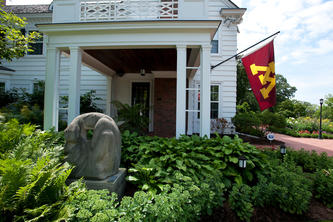
The number of students coming to college with a mental health condition continues to increase, with nearly half of all female students reporting a diagnosis in their lifetime. The 2018 College Student Health Survey of University of Minnesota Twin Cities (UMTC) students found a 29 percent increase in mental health conditions among students since 2015.
The survey, directed by Boynton Health, is intended to identify health issues affecting UMTC students so University officials can be responsive to their needs and create a healthier campus environment.
“We have a profound opportunity to positively influence the health of young adults in college,” said Maggie Towle, interim vice provost for Student Affairs and dean of students. “Graduating from college is a key barometer of future health, including a better job, higher wage and the resources for good health. The College Student Health Survey helps us bring focus and attention to the most pressing health concerns of our students.”
In addition to the mental health findings, the survey found an increase in students experiencing sexual assault and, for the first time, collected information about sexual harassment.
Mental Health
In 2018, 42.2 percent of students reported a mental health diagnosis in their lifetime, a 29.1 percent increase from 32.7 percent in 2015. The increase was particularly significant for female students, with nearly half (48 percent) reporting a mental health condition in their lifetime compared to 39 percent in 2015.
Consistent with past surveys, anxiety (32 percent) and depression (27 percent) are the most frequent conditions stated.
“As student mental health needs grow, we have to ask what resources will be needed to keep pace,” said Gary Christenson, MD, chief medical officer, Boynton Health. “The scale of our campus puts us in a better position to provide students a range of resources. But all colleges and universities are struggling to keep up. Our survey should be a clear sign to policymakers, mental health professionals and public health experts that we urgently need to identify public health approaches to promote good mental health.”
Stress
Unmanaged stress can have serious health consequences, including what appears to be an association between unmanaged stress and higher rates of mental health conditions.
Based on the survey results, more than two in five (42 percent) students were unable to manage their stress. Among these students, 14 percent were diagnosed with depression in the last year. Compared to students who manage their stress, only 6 percent were diagnosed with depression.
Students who reported three or more stressors engage in more risky behavior, including higher tobacco and marijuana use, high-risk drinking, and higher credit card debt compared to students who reported fewer stressors.
The factor students are most likely to say affects their academic performance is stress.
“College can be stressful and students do not necessarily seek help to cope with stress,” said Patricia A. Frazier, PhD, associate chair of the Department of Psychology. “To succeed academically, students need a variety of tools to help them learn how to manage stress.”
Crisis Line Contacts
Students who used a mental health crisis line report using it more often. Of the 3 percent who used a crisis line in 2018, 68 percent contacted the line once, 19 percent two times and 13 percent made contact three or more times. In 2015, of the 2 percent who used a crisis line, 89 percent used the line once, 8 percent twice, and 3 percent three or more times.
UMTC has a 24/7 crisis telephone and text number available to students.
Sexual Assault
In addition to the increase in mental health needs, equally serious is the problem of sexual assault. Nearly two in five female students experienced sexual assault within their lifetime—39 percent in 2018 compared to 32 percent in 2015. Sexual assault experienced by female students in the last 12 months also increased to 11 percent in 2018 from 9 percent in 2015.
In 2017, President Eric Kaler launched the President’s Initiative to Prevent Sexual Misconduct (PIPSM) which is taking a public health approach to the issue. John R. Finnegan, PhD, dean of the School of Public Health, co-chairs the initiative.
“The University is committed to long-term, sustained action to create a culture in which everyone on campus is responsible for preventing sexual assault,” Finnegan said. “We are working hard to provide the tools and resources academic leaders need to address these issues locally, putting words into action and changing the culture one department at a time.”
Prevention actions taken include a campus-wide public education campaign launched this fall, mandatory training for all employees, with over 99 percent completing it by June 30, 2018, professional development for academic leaders, and the hiring of a Health Promotion Specialist at Boynton Health to develop student engagement opportunities.
There was a decrease in students reporting their assault, with 54 percent saying they reported the incident in 2018, down from 58 percent in 2015.
“The reasons people don’t report are universal and many. These include, for example, shame, minimizing their experience, fear of retraumatization and blame, or previous negative experiences with law enforcement,” said Carolyn Porta, PhD, professor, School of Nursing, and Sexual Assault Nurse Examiner. “There are also institutional barriers to reporting like requiring a victim to report to officers in the county where the offense occurred even though that might be far from where the victim lives, or not having confidential options for those who do not speak English."
Sexual assault significantly impacts students’ education, with nearly half (48 percent) of students reporting an incident impacting their academic performance.
Sexual Harassment
The 2018 survey added questions about experience with sexual harassment to better understand the scope of the problem. Seventy-four percent of students said they experienced some type of sexual harassment, with the most common incident reported being told a sexual joke or story. More female students reported harassment than male students (82 percent to 60 percent, respectively).
Perpetrators were most often a peer at the University (56 percent), followed by someone not at the University (32 percent), and a faculty or staff member at the University (13 percent).
The 2018 College Student Health Survey randomly selected 5,974 University of Minnesota Twin Cities undergraduate and graduate students via email; 2,412 students (40 percent) completed the survey. The survey measures eight key areas: health insurance and health care utilization, mental health, alcohol and drug use, tobacco use, personal safety, financial health, nutrition and physical activity, and sexual health. Boynton Health has conducted the survey since 1995.
About Boynton Health
Founded in 1918, Boynton Health is the health care clinic and public health agency serving the University of Minnesota Twin Cities Campus. It is a unit of the Office for Student Affairs.
- Categories:
- Campus Affairs





